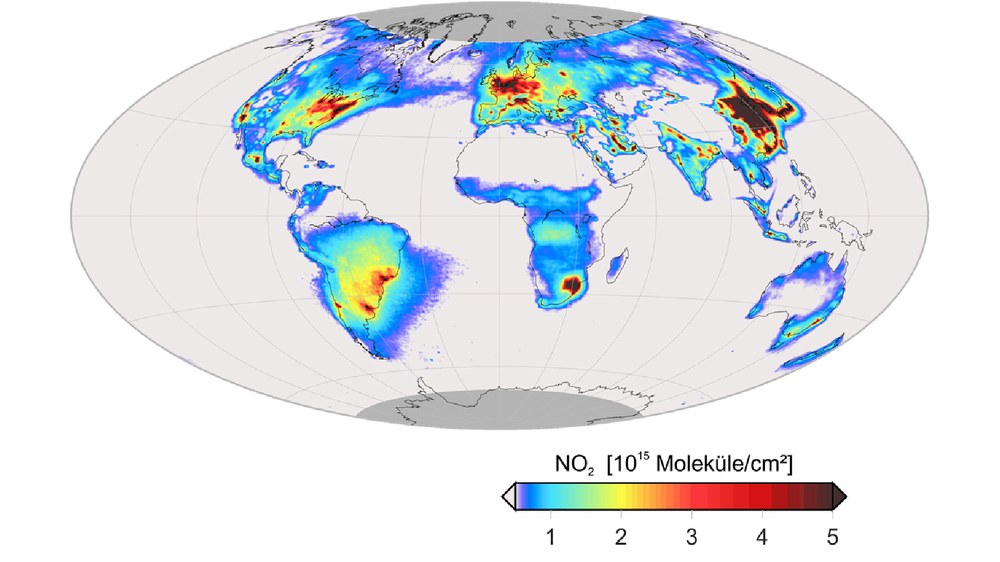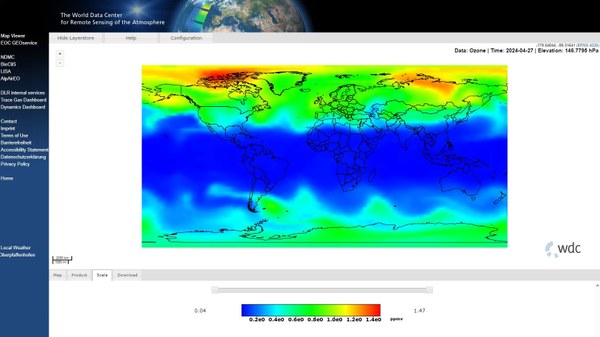Atmosphere Department
Research and Development
The Atmosphere department (DFD-ATM) specializes in the development and generation of innovative data and information products and services, and in geoscience research. The spectrum of activities ranges from basic and applied research to the demonstration of pioneering applications and prototypes of marketable products. This work is primarily based on satellite measurements in the atmosphere to ascertain important climate variables, to provide data for Copernicus products, to support climate and atmosphere research, and to address socially relevant topics such as energy, air quality and health, extreme events, and convention monitoring.
DFD-ATM uses a multitude of freely available satellite data from different sources and with different levels of processing. It generates unique, integrated variables by applying its own retrieval methodologies, assimilating satellite measurements in chemical transport models, and combining the latter with other types of data, information, atmosphere models, and mathematical analytic procedures.
In addition, DFD-ATM develops and makes use of ground-based infrared spectrometers (primarily GRIPS) and imaging infrared cameras to monitor the upper mesosphere and lower thermosphere. This work is prompted by issues relating to climate change and variability, early detection of extreme events, and validation of climate models and variables determined using satellite data, and includes early demonstration of future satellite-based methodologies.
DFD-ATM has established a standing for itself through its own geoscience research using the data it collects and processes and by participating in the public discussion as a neutral authority (for example, relating to the subject of global warming). An important means to this end are acclaimed, peer-reviewed publications that document the expertise of its scientists.
Its own research and development efforts on such subjects as aerosols, clouds, irradiance, trace gases and dynamics have many aspects in common with other DLR institutes, especially the Institute of Atmospheric Physics, the Institute of Technical Thermodynamics, the Institute of Communication and Navigation, and not least EOC’s Remote Sensing Technology Institute. Work on topics of common interest is coordinated and carried out in cooperation whenever possible and realistic.
World Data Center for Remote Sensing of the Atmosphere (WDC-RSAT)
WDC is an archive with a data portal providing access to internationally available satellite data, information and services. The data are not all centrally provided by WDC or stored in DFD’s long-term archive. Instead, WDC functions as a central information node.
As a certified and accredited “Data Collection and Processing Center” of the German Weather Service, WDC has an information technology link to the WMO Information System, which gives it access to WMO data worldwide. As a data publication agent accredited by the German National Library of Science and Technology (Technischen Informationsbibliothek Hannover) and by DataCite, and with the support of the DFG (German Research Foundation), WDC assigns persistent digital object identifiers (DOI) to its data sets according to international standards, thereby contributing to the quality assurance of products for international research.
WDC is a showcase for DFD and EOC, featuring the products it has developed as well as serving as a platform for operational services developed by DFD-ATM, for example, to validate satellite-based measurements or to combine various information levels using OGC-compatible utilities.
WDC is managed by DFD as a service to the international science community and operates under international mandates from WMO, ICSU and NASA. It is intended to use WDC as infrastructure for operating an EU around-the-clock Copernicus service. There are also plans to establish WDC as a portal for atmosphere data for ESA’s CCI programme.
WDC functions are financed as part of DLR’s programme, and internally as a continuously renewed project. From 2015 it will again be advised by a steering committee.
In the future WDC’s technical functions will increasingly be handled by D-SDA.
WDC and its mandate are to be inherently expanded to include global change variables determined with the help of remote sensing technologies, with a focus on regional and global products.
NDMC
NDMC is an international network of ground-based systems (IR and VIS spectrometers and radiometers, LIDAR, radar) for monitoring the mesosphere and lower thermosphere. It was initiated by DFD.
Data from space systems and global circulation models are also included. DFD-ATM contributes its GRIPS systems and jointly coordinates activities with other network partners. Each partner supplies the funding for purchasing and operating the infrastructure it makes available to the network.
NDMC contributes to the UN World Climate Research Programme. All data generated by NDMC are on principle accessible free of charge through WDC.
Schneefernerhaus Environmental Research Station UFS
For DFD-ATM, UFS is an important location for its GRIPS and infrared camera systems because of the lack of disturbing light pollution there. The GRIPS system at UFS will in the future represent the relevant international measurement standard. The connection to the national calibration standard is handled by Germany’s national metrology institute, the Physikalisch-Technische Bundesanstalt, on its own behalf and for the EU.
Through WDC, DFD-ATM is currently establishing and operating a data analysis centre, AlpDAZ, for an association of alpine high-altitude research stations (Virtual Alpine Observatory, VAO). WDC will facilitate VAO access to satellite data, information and services.
Long-term, VAO will be put on a permanent footing as EU European research infrastructure (ESFRI).
The head of ATM is the spokesman for the UFS science advisory committee until 2017 and in that capacity also carries considerable responsibility for the research undertaken at UFS.
The activities connected with developing UFS complement the core activities of DFD-ATM and support public policies to safeguard the role of Bavaria as a science hub.


